Neoliberal Reform in Machu Picchu
Neoliberal Reform in Machu Picchu
Protecting a Community, Heritage Site, and Tourism Destination in Peru
Pellegrino A. Luciano
LEXINGTON BOOKS
Lanham Boulder New York London
Published by Lexington Books
An imprint of The Rowman & Littlefield Publishing Group, Inc.
4501 Forbes Boulevard, Suite 200, Lanham, Maryland 20706
www.rowman.com
Unit A, Whitacre Mews, 26-34 Stannary Street, London SE11 4AB, United Kingdom
Copyright 2018 by Lexington Books
All rights reserved. No part of this book may be reproduced in any form or by any electronic or mechanical means, including information storage and retrieval systems, without written permission from the publisher, except by a reviewer who may quote passages in a review.
British Library Cataloguing in Publication Information Available
Library of Congress Cataloging-in-Publication Data Available
ISBN 978-1-4985-4594-5 (cloth : alk. paper)
ISBN 978-1-4985-4595-2 (electronic)
 TM The paper used in this publication meets the minimum requirements of American National Standard for Information Sciences Permanence of Paper for Printed Library Materials, ANSI/NISO Z39.48-1992.
TM The paper used in this publication meets the minimum requirements of American National Standard for Information Sciences Permanence of Paper for Printed Library Materials, ANSI/NISO Z39.48-1992.
Printed in the United States of America
For my beloved wife, Catuska, and dear son, Antonio
List of Acronyms
AATC | Asociacin de Agencias de Turismo del Cusco |
AGOTUR | Asociacin de Guas de Turismo |
CONSETTUR | Consorcio de Empresas de Transporte Turistico |
COPESCO | Plan Turstico y Cultural de la Comisin Especial |
COTUR | Corporacin de Turismo del Per |
CTAR | Consejo Transitorio de Administracin Regional, Cusco |
EGEMSA | Empresa de Generacin Elctrica Machupicchu, S.A. |
Frente | Frente de Defensa de los Intereses de Machu Picchu |
INC | Instituto Nacional de Cultura (currently under Ministerio de Cultura) |
INRENA | Instituto Nacional de Recursos Naturales (currently Sistema Nacional de reas Naturales Protegidas por el Estado [SINANPE]) |
MDDE | Maryland and Delaware Railroad |
PMP | Programa Machu Picchu |
PROFONANPE | Fondo Nacional para reas Naturales Protegidas por el Estado |
PromPeru | Comisin de Promocin del Per |
UGM | Unidad Gestin Machu Picchu |
Acknowledgments
My most profound debt is to the people of Machu Picchu for receiving me so warmly and for their patience and tolerance while I conducted my research among them. I especially thank Teresa and Luis Callaaupa, Emilio Callaaupa and Raul Sanchez for their assistance in getting me situated during the early phases of the fieldwork. I am no less indebted to the members of Frente de Defensa de los Intereses de Machu Picchu, Oscar Valencia Aucca, Margarita Kaiser, Charo Castillo, Corina Condori Quispe, Regina Zapata and Marina Arias. I also thank Graciela Fernandez and Hctor Alegria for their kindness during my stay. I hope that those who are not mentioned by name will also accept my thanks for taking the time to teach me and to make me feel welcome in Machu Picchu. Conscious of all the kindness they have shown me, I wish them all the best, and personally have only the kindest regards for them.
I am indebted to many people who contributed directly and indirectly to making this project possible, and to whom I wish to express my eternal gratitude. I gratefully acknowledge the wise counsel and warm encouragement of Shirley Lindenbaum, Maria Lagos and Michael Blim who have guided this project from its inception, and for pushing me to develop my thoughts further. I also wish to thank Patricia Mathews Salazar for taking the time to help complete the project and for her suggestions on improving my manuscript for publication.
My handling of the topics dealt with in this research has benefited greatly from discussion with fellow colleagues and friends, particularly Martha Kebalo and Maria Gutierrez.
Special thanks go to Dr. John Beatty for his advice and comments. Since my days as an undergraduate, both he and Dr. Edgar Gregersen have given me tireless encouragement to pursue anthropology. From them I learned how to appreciate the intricacies of language and culture in social interactions without the reductionist tendencies so commonplace in anthropologys linguistic turn.
A large gratitude goes to Martin H. Meisel for his help and concern and for giving me the confidence to continue my work. I am grateful to Sonia Marcela Alvarez, Silvia Palomares, and Nayruth Yanez for their meticulous work transcribing videos and cassettes. I thank colleagues at the University of San Antonio Abad in Cuzco, particularly Zelmira Flores Ampuero, Walter Aguilar Ancori for their friendship and valuable discussions.
I would like to pay special thanks to my field assistant and fellow anthropologist Maria del Carmen Olivera Silva for her truly indispensable help and advice. This project would have never been possible if it were not for her knowledge of the Andes and ethnographic expertise. I am eternally indebted to her.
I am also indebted to several institutions that gave me help and support along the way. I thank the Instituto de Estudios Peruanos in Lima for granting me research affiliation. I thank the Unidad Gestion de Machu Picchu for graciously granting me permission to conduct research in the Sanctuary of Machu Picchu. I thank Dr. Jose de Soto and the members of the Municipio of Machu Picchu for their administrative assistance.
Many others have contributed to this project through the sharing of information, lively conversation, friendship and encouragement. In this regard, space does not permit me to mention them all. However, I would like mention for their interest in my progress: Ruth Santana, David Catacora Gonzales, Larry Testa, Ramiro Campos, Yenny Atahulluco, Linda and Blanca Serrano, Susana Huaman, Quintina Huaman, and Mario Herrera.
Finally, I would like to thank my family, especially my wife, Catuska Sissi, for believing in me and for pushing me to complete this book.
Introduction
Living Under the Hen
Privatization is when the government comes in and takes away your property.
(Privatizacin es cuando el gobierno viene y se apodera de tu propiedad.)
Victor, Huayllabamba, Machu Picchu
It was February 2002, also the low tourist season, when I spotted Rosa dashing across the plaza and towards Av. Pachacutec. She called out to inform me that an important town meeting was taking place at the cultural center. Rosa said that a demonstration, a tourism stoppage, or both was being planned. The purpose of the meeting was to organize a challenge against state property regulations in the protected areas of the Sanctuary of Machu Picchu that overlaps the district of Machu Picchu; the political district of Machu Picchu, comprised of a town and various communities, overlays the national park and protected area almost entirely. Rosa was straightforward about the problem: We are not property owners here (No somos propietarios ac).
I was confused by Rosas statement at first. Sanctuary laws prohibiting property had been imposed for some twenty years before my arrival and people were aware of them. When I got to the town hall (cultural center) I found some one hundred townsfolk fuming and talking over a barrage of concerns about privatization. I had gone to Machu Picchu to do my doctoral fieldwork, initially focused on memory and landscape meanings in the Andes. Rosa herself would tell me about how as a child she played by the Incan stones of the Citadel. However, it is not uncommon during fieldwork to shift the direction of research in accordance with the realities and concerns of the people one is supposed to represent. On my mind was Orin Starns (1991) critique of how ethnographies of the southern Peruvian highlands in the 1970s failed to anticipate the rise of the Shining Path and the brutal protracted civil war that resulted. Starn claimed that the anthropology of the time generally ignored signs of discontent and growing conflict because of an ethnographic framework that described Peruvian rural life as static, stressing the local ritual or ecological aspects of communities as isolated units (ibid.: 4). Regardless of the merits or shortcomings of Starns argument, I was aware of the need to refocus my ethnographic attention to the pressing realities of the people of Machu Picchu and became engrossed in describing their mobilization. The Machupiccheos had banded together to form a challenge against conservation agencies and the privatization of the train system. The meeting resulted in people taking an active role by electing a Front that would organize a challenge that would ultimately lead to the remaking of their own town. Throughout this book, I describe the trials faced by people who live in the district of Machu Picchu, a community, a heritage site and touristic destination, as well as the nations preeminent symbolthe Sanctuary of Machu Picchu. The national revenue the Sanctuary generates leads to the common expression that its the hen that lays the golden egg for Peru. The main part of the fieldwork discussed here was conducted in July 20012002 and captures a pivotal moment in the transition towards Perus neoliberal economy that led to the remodeling of Machupicchu Pueblo. The ethnography is an account of residents who came to believe that land possession rights as opposed to property rights under neoliberal reform was not sufficient to protect their district autonomy, and the right to make a life in their community. I describe how neoliberalism entered the lives of everyday people in the interactions with agents that push its policies. It is about the politics of small things, to quote Jeffery Goldfarb, as people make history in their social interactions (2007: 1). I focus on the intricate set of relationships involving tourism and heritage as experienced in local context under a shift towards free-market policies and privatization (Silverman 2002; Breglia 2006). What I analyze is a tumbling set of positions stretching across a range of global relations entangled in market liberalization. I have two central aims. As an ethnographer, the first is to bring to life the actions and struggles of the people involved in this account, and to provide a case study of identity in the Andes drawn into a process of dispossession under state and market forces; it is about people who challenged, negotiated and attempted to create a new direction for themselves. In that respect, the second goal is to make sense of the performative nature of the social interactions of the Machupiccheos and authorities as they challenge and negotiate neoliberal politics. The performances are not focused on the touristic but on the policies and ideologies people grappled with under a privatization regime that threatened belonging and livelihoods. What I intend to analyze is the moment neoliberalism incorporated the lives of a group of people as a concept and a cultural object, and how it became the proverbial elephant in the room guiding and shaping possibilities. I organize the ethnography around peoples social interactions and strategic engagements that were articulated and enacted and analyzed for persuasiveness as Machu Picchu was fused into a new spatial economy involving racial identities during a key moment in Perus economic history (Silverman 2002: 882). Relevant to understanding neoliberalism is an examination of how peoples social identities undergo a mortification process. In
Next page
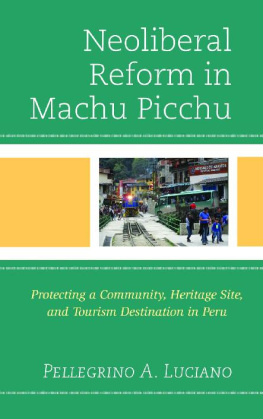

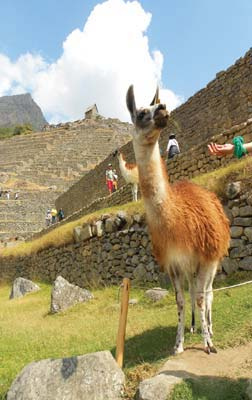
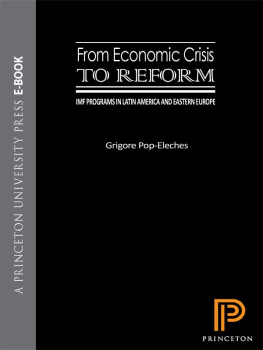

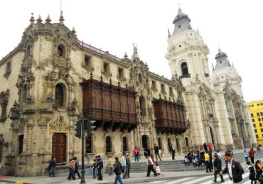

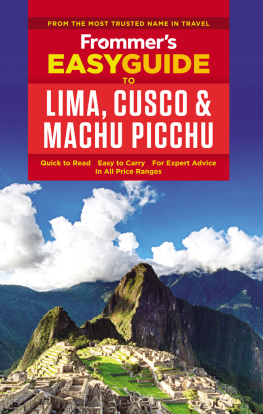
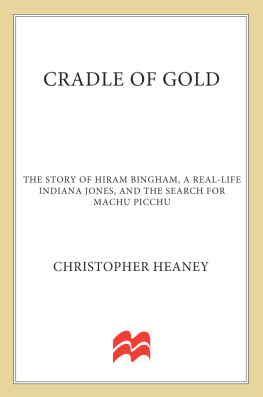
 TM The paper used in this publication meets the minimum requirements of American National Standard for Information Sciences Permanence of Paper for Printed Library Materials, ANSI/NISO Z39.48-1992.
TM The paper used in this publication meets the minimum requirements of American National Standard for Information Sciences Permanence of Paper for Printed Library Materials, ANSI/NISO Z39.48-1992.